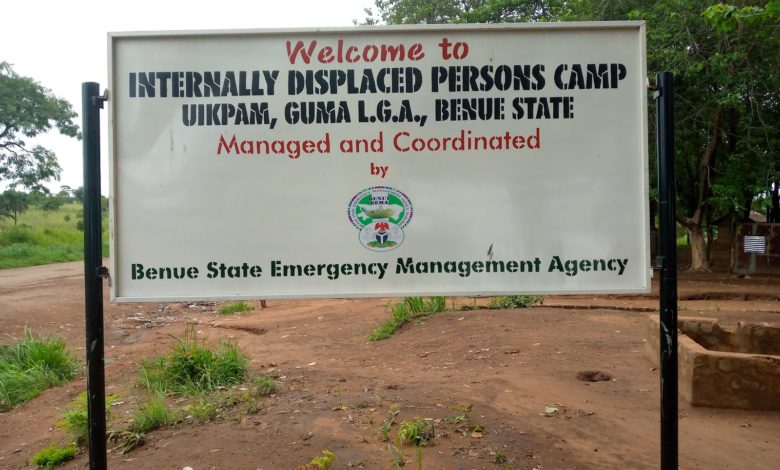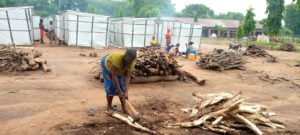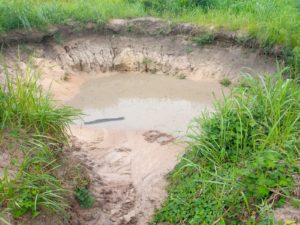Guma: Heightened Insecurity Leaves Benue IDPs In Constant Fear
The killing of Charles Shitile by armed herders, half a kilometre from Uikpan Internally Displaced Persons (IDP) camp in Benue, North-central Nigeria, has left the displaced traumatised.

Nguser Charles Shitile, after staying for days without food, looked forward to her husband’s arrival. He had called her phone earlier with the good news that he had made some money.
But Charles Shitile never made it home.
He was intercepted by herders along with his friend half a kilometre away from Uikpan IDP camp in Guma Local Government Area (LGA) of Benue State, North-central Nigeria.
Gunshots left many of the IDPs in disarray as they scampered for safety. Nguser, on the other hand, was greeted with news of her husband’s death. Gone was the hope of eating food that day.
“I feel a sense of his spirit disturbing me with each passing minute. Anything I do, I always feel him around me,” Nguser told HumAngle.
“Maybe I shouldn’t have allowed him to go look for food in the first Place. He was a nice man and a comfort to me,” she said.
Nguser and Charles had two children together, and she is now left to cater for them alone.
Still no hope of returning home
What seemed like a minor misunderstanding and mere threat has led to the displacement of about eight communities in Guma LGA.
Places like Umenge, Tukura, Tse-Daudu, Atongo, Gawan, Hasa, Tsawanga, Tse-umenge are marked as “dead zones” for villagers because of the activities of armed herders.
“All our villages have been razed down, farms and property destroyed. Anyone who tries to go there would be killed,” Hemabaior Stephen, the camp chairman said. “Seven of my brothers were killed. Many people here have lost two or three people to the attacks.”
“Even here in the Uikpan IDP camp, there are days we don’t sleep, including the villagers themselves. We all come out with torch lights, especially when we hear that they are coming,” Ferdinand Atongo said.
He continued: “I have my own team as a youth leader. We secure the territory because many times they come in the night. Sometimes we stay awake just to make sure others sleep well.”
Uikpan camp has seven Community Police personnel assigned to them. They are not enough and most are hardly around.
Selling firewood and alcohol for survival
Mama Shitile Okpile (late Charles’s mother) has been sick and refuses to take medication since her son was killed.

Selling firewood and Ogogoro (dry gin) is Mama Shitile’s means of survival. She makes up to One Hundred Naira a day to at least buy corn and Millet to eat.
“I have lost my only surviving son who used to run around for food for us. I do sell upto a hundred naira a day and sometimes nobody would buy and I will have to go hungry for days.”
Terrible living conditions
Tsekaa Adogori, 88, was a farmer with a lot of goats and sheep. Despite his age, he often went to the farm to inspect his crops.

Photo credit: Jairus Awo/HumAngle
But all these are in the past because Adogori now lives at the mercy of Non Governmental Organisations (NGOs) and other donors.
When HumAngle visited, Adogori had not eaten because nothing was available. Being the eldest in the camp, his portion is readily made available when organisations or individuals visit.
“I’m weak, my legs are feeble and I can’t go to beg for food like others. If I were in my community, I would have goats and other animals. I lost them all.”
“Water has been our major challenge in this camp, when we came we were able to dig dams for ourselves. However those dams are not good anymore, yet, we drank from it,” the camp Chairman, Mr Hemabaior said.

He continued, “We also have the challenge of toilets. Over 500 households live in this camp, yet we defecate in the open around the camp. At times we accidentally meet with our women there. It’s a shameful thing. And it affects our water, especially when rain falls. Yet we still have to drink it.”
Support Our Journalism
There are millions of ordinary people affected by conflict in Africa whose stories are missing in the mainstream media. HumAngle is determined to tell those challenging and under-reported stories, hoping that the people impacted by these conflicts will find the safety and security they deserve.
To ensure that we continue to provide public service coverage, we have a small favour to ask you. We want you to be part of our journalistic endeavour by contributing a token to us.
Your donation will further promote a robust, free, and independent media.
Donate HereStay Closer To The Stories That Matter




